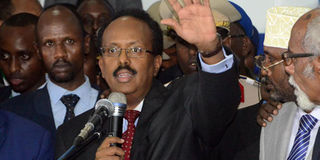Popular new president offers chance for fresh start for Somalia and Kenya

Newly elected President of Somalia Mohamed Abdullahi 'Farmajo' gestures as he makes an address on February 8, 2017, in Mogadishu after he was elected president. PHOTO | MUSTAFA HAJI ABDINUR | AFP
What you need to know:
- President Kenyatta's advisers on security matters must admit that the military incursion into Somalia was one of the greatest foreign policy blunders in Kenyan history.
- The new president of Somalia offers a chance for a re-evaluation of Kenyan policy.
- It is in Kenya’s best interests to organise a gradual and orderly retreat from Somalia.
- Kenya should work with the new Somalia president to achieve his goals which would benefit Kenya if he succeeds.
A political earthquake occurred in Somalia on Wednesday. Against all expectations, Mohamed Abdullahi “Farmajo” was elected president, bringing scenes of joy that Mogadishu has rarely witnessed over the last few decades.
Virtually every analyst had predicted that the incumbent, Hassan Sheikh Mohamud, who was the best financed candidate and who had the backing of powerful countries including Ethiopia and Turkey, would buy enough votes to stay in power.
Last-minute realignments, though, brought victory for Farmajo. It is easy to overstate the importance of elections, sometimes, but Farmajo’s victory seems like a genuinely significant development in Somalia’s grim recent history.
He was the choice of the man on the street because, when he served as Prime Minister in 2010, he proved to be one of those rare Somali politicians genuinely angry about the state of the nation.
He sought to stamp out official corruption. He led a simple lifestyle and even travelled economy class.
Most importantly, he recognised that Somalia will never know stability until it builds up its own security forces.
He organised a biometric registration of members of the military to stop the racket where Generals and various power brokers line their pockets with salaries of ghost soldiers.
PUBLIC SERVANTS PAID ON TIME
He also ensured soldiers and public servants were paid on time. Listening to the BBC on Wednesday, there was momentary confusion when gunfire broke out as the results were being tallied.
The reporter thought an attack was under way. In fact, it was soldiers who were firing into the air in celebration.
The election of the new president should offer Kenya a chance to re-evaluate its relationship with Somalia.
In the cold, harsh light of day, and with the benefit of hindsight, the advisers to President Kenyatta on security matters must admit that the military incursion into Somalia was one of the greatest foreign policy blunders in Kenyan history.
The price Kenya has paid is incalculable. The lives of the Garissa University students and the slaughter of soldiers in Somalia has touched virtually every village in the country.
The slowdown in tourism, particularly between 2011 and 2014, exacted a major impact on the economy.
It is in Kenya’s best interests to organise a gradual and orderly retreat from Somalia.
The new president of Somalia offers a chance for a re-evaluation of Kenyan policy.
Farmajo is a self-declared nationalist. He wants to build up the Somali national army and to see a reduction in foreign influence in the country.
He also wants to talk to the elements of al-Shabaab who are not wedded to the doomsday vision of global Jihadists who prefer perpetual war.
Kenya should take the chance to work with the new president to achieve his goals which would benefit Kenya if he succeeds.
A stable Somalia is in Kenya’s best strategic interest. For good or ill, the economies of the two countries are virtually intertwined.
As far back as 2011, I was surprised that in Mogadishu I could buy Safaricom airtime for Sh250 and get change in Kenyan shillings.
PEACE AND STABILITY
Kenya benefits when Somalia is stable. Some Somali nationalists claim that Ethiopia, on the other hand, because of the tortured history between the two countries, prefers to keep Somalia in turmoil, which is one of the reasons the outgoing president was so unpopular because of his ties to Addis Ababa.
History has shown that foreign interventions will never lead to peace and stability in countries facing insurgencies that have some support within sections of the population.
The American intervention in Afghanistan and Iraq has been a seminal, expensive failure.
It is better to build up local forces and allow countries to fight their own battles. Kenya should focus on securing the border from the Shabaab and countering terrorism. It should pull its troops out of the country.
The national security team has done a reasonably good job in tackling terrorism and it should boost those efforts.
In the meantime, someone should advise President Kenyatta against the very aggressive foreign policy posture his government has adopted and which could end up costing the country dear.
While Riek Machar is not a good actor, for example, the way in which Kenya has totally aligned itself with Salva Kiir is unwise and could backfire.
With Somalia, Kenya would benefit from a Turkish-style “zero problems with neighbours” approach that focuses on economic engagement.
The outbreak of joy following Farmajo’s victory recalls the reaction to Kenya’s election in 2002 when Kanu fell.
[email protected] @mutigam





